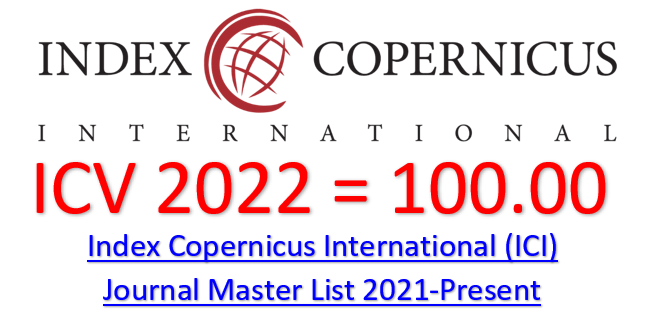The Creative Game Tools and Mother's Motivation to Know Educational for Children Aged 1-3 Years
DOI:
https://doi.org/10.55018/janh.v5i2.163Keywords:
Children, Game, Mother, MotivationAbstract
Background: A mother's motivation to know about educational and creative game tools has an important role in optimal child growth and development according to age level so that it can be fulfilled properly. Educational and creative game tools are game tools that can optimise children's development according to their age and level of development. Examples of educational and creative games for children aged 1-3 years are drums, balls with sleighs inside, household items that do not break easily (plastic cups, spoons, plastic bottles, buckets, etc.), large blocks, cardboard, picture books, coloured pencils, plasticine, simple puzzles. The research aims to determine mothers' motivation to learn about educational and creative games for children aged 1-3 years in Tanjungsari Village, Sukorejo District, Blitar City.
Methods: Research design using descriptive, Population 500, sample 50 respondents, using purposive sampling technique, research instrument using questionnaires; this research was carried out on March 20, 2023 - April 15, 2023, with the mother's motivation variable to know educational and creative game tools for children aged 1-3 year. Data were analysed using percentages and interpreted quantitatively.
Results: The results of research from 50 respondents showed that all respondents had strong motivation (100%) because the majority of mothers had received information about educational and creative game tools. Mothers' motivation to find out about educational and creative game tools for children aged 1-3 years is influenced by several factors, namely age, education, occupation, whether they have received information, and where the information was obtained
Conclusion: It is hoped that respondents will be able to maintain and motivate other mothers to seek more information to broaden their knowledge so that they are more motivated to know about the benefits and uses of educational and creative play equipment for children aged 1-3 years.
Downloads
References
Alhussayen, A., Alrashed, W., & Mansor, E. I. (2015). Evaluating the User Experience of Playful Interactive Learning Interfaces with Children. Procedia Manufacturing, 3, 2318–2324. https://doi.org/10.1016/j.promfg.2015.07.378
Arikunto, & Suharsimi. (2006). Prosedur Penelitian Suatu Pendekatan Praktik, Edisi Revisi VI. PT Rineka Cipta.
Bargas, R. M. O., Briceño, E. D., & Loria, M. L. P. (2016). Cooperative games: Effects on assertive behavior in sixth-graders in public schools. Revista Electronica de Investigacion Educativa, 18(3), 170–179. https://www.scopus.com/inward/record.uri?eid=2-s2.0-84995467223&partnerID=40&md5=2012588a48f972d96ba74210cdb9673a
Burbienė, A., & Mazolevskienė, A. (2018). Parent’s education for child’s creativity development in the family. Pedagogika, 132(4), 115–129. https://doi.org/10.15823/p.2018.132.7
Dere, Z. (2019). Investigating the creativity of children in early childhood education institutions. Universal Journal of Educational Research, 7(3), 652–658. https://doi.org/10.13189/ujer.2019.070302
Dongari, D., Kumar, K. S., & Maadhavi, D. (2022). Effectiveness of Self-Instructional Module on Knowledge regarding Maternal Deprivation Syndrome among Mothers in Selected Community Areas. Journal of Applied Nursing and Health, 4(1 SE-Articles), 61–70. https://doi.org/10.55018/janh.v4i1.36
Garaigordobil, M., Berrueco, L., & Celume, M.-P. (2022). Developing Children’s Creativity and Social-Emotional Competencies through Play: Summary of Twenty Years of Findings of the Evidence-Based Interventions “Game Program.” Journal of Intelligence, 10(4). https://doi.org/10.3390/jintelligence10040077
Muhammed A, H., & Alex. (2022). Immunization Status Analysis Based On Knowledge Characteristics And Family Support. Journal of Applied Nursing and Health, 4(1 SE-Articles), 146–151. https://doi.org/10.55018/janh.v4i1.67
Şakrucu, E. D., Ata, S., & Kışla, Ş. (2023). Fathers’ Views and Understandings on Promoting Creativity in Children Aged 24-36 Months: A Qualitative Study. Primenjena Psihologija, 16(3), 297–324. https://doi.org/10.19090/PP.V16I3.2436
Samsi, S. N., Rufaridah, A., Marlia, S., Dahlan, A., Komalasari, W., & Husni, L. (2023). Edukasi Pendidikan Kesehatan Pada Pasangan Usia Subur Dalam Pemilihan Kontrasepsi. Jurnal Abdi Kesehatan Dan Kedokteran, 2(1 SE-Articles), 74–83. https://doi.org/10.55018/jakk.v2i1.30
Sari, L. L., Hilinti, Y., Ayudiah, F., Br.Situmorang, R., & Herdianto, E. (2023). Antropometri Pengukuran Status Gizi Balita Di Ra. Makfiratul Ilmi Bengkulu Selatan. Jurnal Abdi Kesehatan Dan Kedokteran, 2(1 SE-Articles), 1–6. https://doi.org/10.55018/jakk.v2i1.6
Sergeeva, B. V, & Ignatova, D. A. (2018). The system of organizing the extra-curricular activities of sports and recreation trend in elementary school. Perspektivy Nauki i Obrazovania, 34(4), 209–214. https://www.scopus.com/inward/record.uri?eid=2-s2.0-85059571898&partnerID=40&md5=f7c2e0a81f10f4ee785d0387ef885e4f
Serious Games Development and Applications - Second International Conference, SGDA 2011, Proceedings. (2011). Lecture Notes in Computer Science (Including Subseries Lecture Notes in Artificial Intelligence and Lecture Notes in Bioinformatics), 6944
Downloads
Published
How to Cite
Issue
Section
License

This work is licensed under a Creative Commons Attribution-ShareAlike 4.0 International License.

























